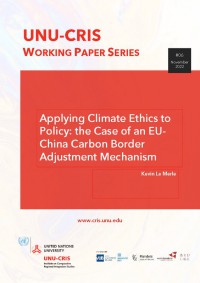Applying Climate Ethics to Policy: The Case of an EU-China Carbon Border Adjustment Mechanism

Despite the instrumental importance of ethical principles in the value-laden field of climate diplomacy discourse, little research measures the practical implementation of fundamental principles of global redistributive climate justice in policy outcomes. More specifically, Henrik Horn and André Sapir have identified this research need when it comes to the EU’s Border Carbon Adjustments (CBAM) entailed by the European Green Deal (EGD). They state that “it is equally important that the measure be perceived as fair in terms of the international distribution of costs and benefits that it entails”.1 This begs the question: Do CBAM respect fundamental principles of global redistributive climate justice? To answer such a question, this paper conducts a case study exploring the socioeconomic consequences of implementing CBAM between the EU and China. By taking a closer look at climate policy practice and its overlap with research outputs from climate ethics, this paper intends to bridge the gap between fundamental ethics, policy discourse, and policy outcomes. I have found that CBAM only secures a weak justification according to Harm-Avoidance Justice: their associated emissions reductions are projected to be only marginal, yet their immediate welfare cost is noticeable. In Burden-Sharing Justice frameworks, CBAM also stands on murky grounds. In the short run, the Polluter Pays Principle would make highly polluting Chinese companies pay through their loss of market shares, but this would be limited to companies who export their products to the EU. Meanwhile, on an international level, it emerges the Chinese community would indirectly be asked to bear the costs for pollution that mostly continues to benefit consumers in the EU. On the Ability to Pay Principle side, China does have the capability to pay for climate action, and CBAM would make them pay. However, CBAM would make China pay disproportionately more than the EU which stands to generate revenue and record welfare gains through CBAM. This transgresses the ATP principle.
